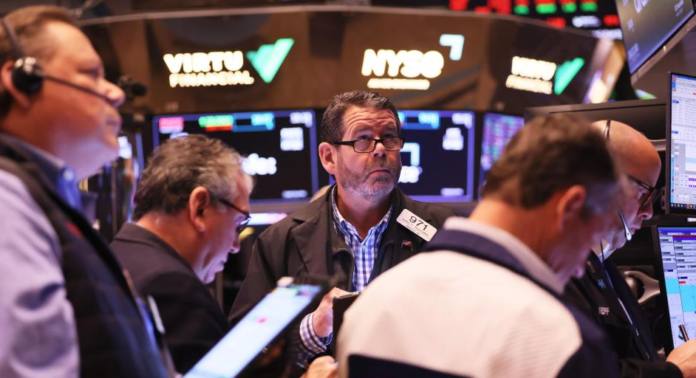The ghosts of the great economic crisis of 2008 have once again hovered over the stock markets of the main stock markets on both sides of the Atlantic Ocean: the fall of Silicon Valley Bank (SVB) has caused a financial earthquake in just one week that has been strongly felt in the United States and in Europe.
The worst day was Wednesday, to which most analysts and experts added the adjective ‘black’ , especially reserved for those days on the Stock Market in which the falls are very pronounced.
The fall of the SVB spread to large European banks such as the Swiss Credit Suisse or the French BNP Paribas , whose prices have plummeted this week and have caused a system to capsize like it has not been seen since the coronavirus pandemic, whose greater intensity is fulfilling its third anniversary.
The Madrid Stock Exchange and the Ibex 35 have not been oblivious to this fateful week for banks, and the percentage falls in the Madrid parquet have presented values that have not been seen in years. This has been the progression of the worst week for credit institutions in recent years:
Friday March 10
The shock wave effects of this new crisis began to be felt when the US financial regulators announced the closure of the SVB due to lack of liquidity and insolvency.
Just a couple of days earlier, the SVB, which specializes in serving start-ups , announced that it was going to seek a capital increase to try to deal with its financial problems, which had forced it to divest investments worth around €21,000 . million dollars, with losses of about 1,800 million.
News of the bank’s closure sent Wall Street tumbling, and at the same time, a 27% rise in the VIX volatility index , also known as the ‘fear index’ on Wall Street.
The anxiety was already noted on the European stock markets on Friday: Madrid, London, Milan, Frankfurt and Paris closed the day with the main banks in the red, with falls such as Sabadell (5.11%), HSBC (4. 59%), Finecobank (4.58%), Deutsche Bank (6.22%) or Société Générale (4.49%).
Monday March 13
The beginning of the new week, far from calming the waters, meant more turbulence that increased the concern of analysts. The world financial markets registered large losses due to the fear of investors that there could be more entities affected by the same situation and the situation of 2008 would be repeated.
The IBEX 35 fell 3.51% , its biggest collapse since June 2022 , while in other countries, the French CAC 40 closed in the red of 2.9%, the German DAX fell 3.04% or the FTSE 100 English 2.58%.
In Madrid, the most affected were financial institutions, with a collapse of more than 6% in all banks listed on the IBEX.
In New York, there was a slight drop in the Dow Jones Industrial of 0.28%, but a sharp drop in financial institutions. Western Alliance Bancorp and First Republic Bank , which had lost 75 and 65% respectively at the start of the session, ended the day down 50% for the second and 23% for the first.
Meanwhile, the president of the United States, Joe Biden , came to the fore to defend the soundness of the country’s banking system , after the “quick” action of the financial authorities, and to highlight the importance of strengthening banking regulation.
“Americans can trust that the banking system is safe. Their deposits will be there when they need them ,” said the US president.
Tuesday March 14
The news of the last few days put an idea on paper: the constant rises in rates on both sides of the Atlantic could be having an undesired effect and this tension in the rope could cause unpredictable breaks.
In the Madrid Stock Exchange, a day was lived in green, although it was the calm before the storm. In any case, the IBEX 35 rose 2.23%, driven by good inflation data in the United States, and banks also benefited from this positive trend.
Banco Sabadell, the entity hardest hit on Monday after the resolution of the US entities, rose +4.50%. CaixaBank (+4.50%) and BBVA (+3.42%) also showed robust recoveries.
With respect to the rest of the listed banks, Santander rose 3.03%, while Bankinter did so by 3.02%. Unicaja Banco experienced the most timid evolution, rebounding by 2.06%.
The rest of the parquets of the old continent also closed in green. But they did not know what awaited them on Wednesday.
Wednesday March 15
Credit Suisse’s shares plummeted, 30% , on the Zurich Stock Exchange, marking a new all-time low : the Saudi National Bank, its main shareholder, announced that it would not give the Swiss entity any more financial assistance to face its battered accounts.
The news was important, because Credit Suisse is one of the 20 largest banks in Europe and one of the top 50 in the world.
The European stock markets collapsed like a house of cards: the IBEX 35 yielded 4.37% , the largest since the omicron variant of the coronavirus was found, at the end of 2021.
All banks closed negative, experiencing drops of up to 10% that became even greater throughout the day. Unicaja lost 6.06%; Bankinter, 6.46%, Caixabank, 6.72%; Santander, 6.89%; BBVA, 9.6%; and Sabadell, 10.49%.
Wednesday was just as black in the rest of Europe : the fall in the Spanish stock market was the second largest of the main markets after the Italian (-4.61%) and slightly less than the German stock market (-3.27%) , the French (-3.58%) and the British (-3.83%).
The President of the Government, Pedro Sánchez, intervened to try to maintain a message of calm. The head of the Executive proposed “tranquility, prudence and follow-up” in the face of the worrying news, and recalled that ” the Spanish financial sector is above the [European] average both in terms of liquidity and solvency ratios” .
Meanwhile, the European Central Bank (ECB) began to contact the European banks that it directly supervises to find out what possible exposure they had to Credit Suisse , given the collapse of the Swiss bank.
Such was the fall of this entity that the Swiss National Bank (SNB) and the Swiss Supervisory Authority for Financial Markets (known by the acronym FINMA), the country’s central bank and financial regulator, respectively, announced their intention to provide liquidity to Credit Suisse “if necessary”.
But again from the United States came bad news: the rating agencies S&P Global Ratings and Fitch downgraded the credit rating of another entity, the First Republic Bank (FRB) , to the category of ‘junk bond’ due to the outflow of deposits from the entity and even after US regulators pledged to support the banking sector after the collapse of Silicon Valley Bank (SVB).
Thursday March 16
The European Central Bank makes a move. Far from proposing a brake on interest rate rises, the ECB Governing Council decides to raise interest rates by 50 basis points.
The First Vice President and Minister of Economic Affairs and Digital Transformation, Nadia Calviño, interprets this decision as a “clear message of confidence” in the European financial system in the midst of the Credit Suisse and Silicon Valley Bank crisis.
In fact, the IBEX 35 grew 1.50% at the close of the session on Thursday, which led it to settle at 8,890.2 integers.
At the same time, Credit Suisse shares started Thursday’s session with a strong rebound of 32.59% to 2.25 Swiss francs, after the entity turned to the Swiss National Bank (SNB) to bolster its liquidity in 50,000 million francs (about 50,750 million euros).
Added to this optimistic climate was the deputy governor of the Bank of Spain, Margarita Delgado, who dismissed the probability in Europe of a crisis like the one experienced after the collapse of Silicon Valley Bank (SVB) and said that the exposure of Spanish entities to Credit Suisse was “residual”.
Friday March 17
While the Supervisory Board of the European Central Bank (ECB) met this Friday in an extraordinary way to assess the situation in the financial markets and the banking sector after the recent turmoil, the news was bad again.
Credit Suisse shares fell more than 11% again, after exceeding the half session on the Zurich Stock Exchange. Worse appearance presented the First Republic Bank, since its titles plummeted about 31.5% at mid-session on Wall Street , up to 23.50 dollars (22 euros), despite knowing that the large US banks were in talks to rescue him.
Specifically, eleven US banks, including the four largest (Bank of America, Citigroup, JPMorgan Chase and Wells Fargo) announced a total injection of 30,000 million dollars (about 28,180 million euros) in First Republic Bank to strengthen its liquidity and prevent its collapse.
In Madrid, the Ibex 35 closed at 8,719.3 integers after losing 6.09% in the blackest week in recent years , the second consecutive week in ‘red’. What remains to be seen is whether, as of Monday, the waters have calmed or the storm continues in financial markets that once again deal with the ghosts of a not so distant past.




